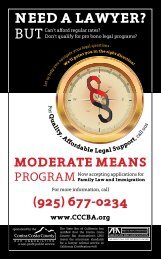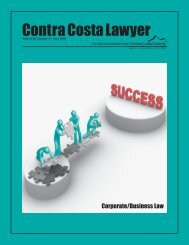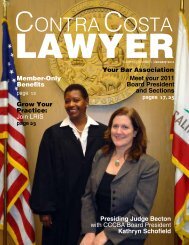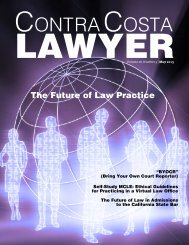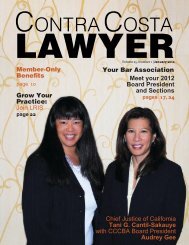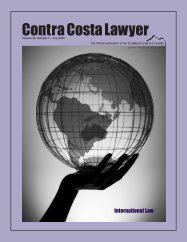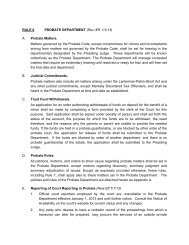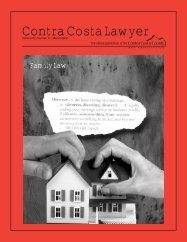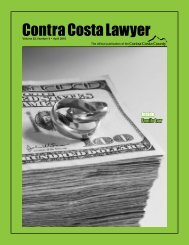Alternative Dispute Resolution Issue - Contra Costa County Bar ...
Alternative Dispute Resolution Issue - Contra Costa County Bar ...
Alternative Dispute Resolution Issue - Contra Costa County Bar ...
Create successful ePaper yourself
Turn your PDF publications into a flip-book with our unique Google optimized e-Paper software.
Elder Law isAlzheimer’sPlanningThe Law Offices of David M. LedermanDavid M. LedermanCertified Family Law SpecialistState <strong>Bar</strong> Board of Legal SpecializationThe average survival rate is eight years after beingdiagnosed with Alzheimer’s — some live as few asthree years after diagnosis, while others live as longas 20. Most people with Alzheimer’s don’t die fromthe disease itself, but from pneumonia, a urinarytract infection or complications from a fall.Until there’s a cure, people with the disease willneed caregiving and legal advice. According to theAlzheimer’s Association, approximately one in tenfamilies has a relative with this disease. Of thefour million people living in the U.S. withAlzheimer’s disease, the majority live at home —often receiving care from family members.If the diagnosis is Alzheimer’s,call elder law attorneyMichael J. YoungEstate Planning, Disability, Medi-Cal,Long-term Care & VA PlanningProtect your loved ones, home and independence.n925.256.0298www.YoungElderLaw.com1931 San Miguel Drive, Suite 220Walnut Creek, California 94596Tom SmithAssociate AttorneyPracticing exclusively in all aspects of Family Lawin Walnut Creek and Antioch3432 Hillcrest Avenue • Suite 100 • Antioch, California 94531309 Lennon Lane • Suite 102 • Walnut Creek, California 94598Phone 925.522-8889 • Fax 925.522-8877www.ledermanlaw.netthe bench, will influence the future of familylaw ADR services at the courthouse.Family and civil mediators are increasinglyrecognizing that mediation is never completelyevaluative (positional bargaining against thebackdrop of the imagined best-case versusworst-case trial outcomes) or completelyfacilitative (interested-based bargaining).Instead it is always a mixture of both in varyingproportions. Family law attorneys havetended to emphasize a facilitative approachwhile providing the parties with basic informationabout the law and scrutinizing thepersonal dynamics of the process to assesswhether a client may be making a deal forthe wrong (eg., negative psychological)reasons. A family law mediator may insistthat a self-represented client see a consultingattorney to ensure that the client receives anevaluative analysis in a manner that does notsubvert the neutrality of the mediator’s relationshipto both self-represented parties.There remains great untapped potentialfor ongoing exchange between family law andcivil mediation methods. For example, familylaw attorneys may opt to hire a privatemediator (or private judge if a more evaluativeapproach is desired) to conduct a marathonday-long confidential mediation or settlementconference following the civil mediationmodel, with the clients and their attorneysattending and participating in joint sessionsand caucusing. At the same time, civilmediators have been trying out facilitativetechniques, such as giving empathetic feedbackto each client, finding that such techniquessometimes build a modicum of mutualconsideration between the mediating parties,which becomes the key to reaching a settlementin a negotiation process that is otherwisepredominantly evaluative.As <strong>Contra</strong> <strong>Costa</strong> Family Law ADR entersits fourth decade, the most dynamic areas ofdevelopment are likely to include the continuing“cross-cultural” exchange between familylaw and civil mediators and the further expansionof ADR institutions at the courthouse. u— Faith Jansen, a CertifiedFamily Law Specialist in WalnutCreek, has chaired the MediationCommittee of CCCBA’s FamilyLaw Section since 1999 and haspracticed family law since 1981.8 November 2009



